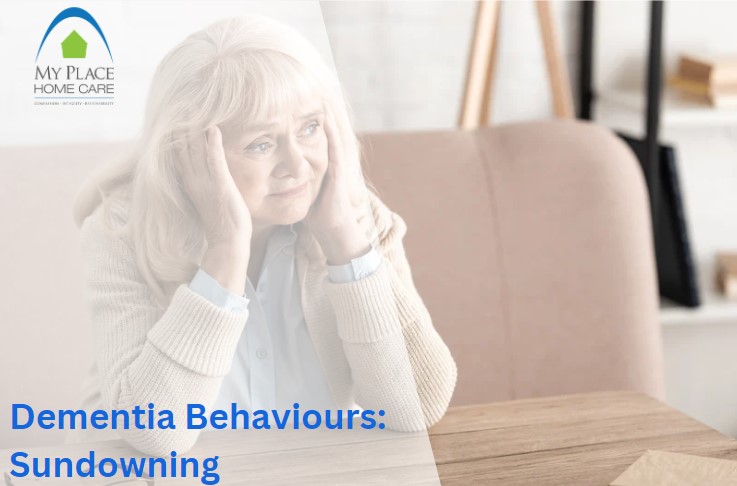
DEMENTIA BEHAVIOURS: SUNDOWNING
Sundowning, also known as late-day confusion, is a common behavior associated with dementia, particularly in the mid to later stages of the condition. It refers to a set of symptoms that worsen in the late afternoon or evening, causing increased confusion, agitation, restlessness, and even aggression. Understanding and managing sundowning can help ease the distress it causes for both individuals with dementia and their caregivers.
Characteristics of Sundowning
Sundowning can affect each person differently, but there are some common characteristics. Persons with dementia that experience sundowning may exhibit increased confusion, agitation and irritability, restlessness and pacing, mood swings, increased paranoia or hallucinations and wandering. Your loved one may become more disoriented as the day progresses, struggling to recognize familiar people or surroundings. They may become restless, pacing around the house or moving aimlessly without purpose. Some persons with dementia have a tendency to wander which can be particularly dangerous if the individual attempts to leave the house. In addition, persons who experience sundowning, may experience agitation and irritability. Increased agitation may lead to anxiety, frustration, and sometimes anger. Mood swings are common among sundowning patients such as calmness to irritability or sadness. Individuals may experienced increased paranoia, delusions, or hallucinations, believing that something or someone is out to get them or that they are in a unfamiliar place.
Possible Triggers of Sundowning
There are some potential triggers that cause persons with dementia to experience sundowning. The potential triggers are fatigue, changes in light, hunger or thirst, overstimulation and sleep disturbances. physical and mental exhaustion from the day’s activities may contribute to sundowning. As their energy decreases, it becomes harder to cope with cognitive challenges. The fading daylight may cause confusion and anxiety, especially for individuals who have difficulty distinguishing between day and night. Sleep disturbances such as poor sleep patterns or disruptions in the body’s natural circadian rhythm can affect how an individual with dementia behaves in the evening. Overstimulation is another potential trigger that can lead to sundowning. A noisy or chaotic environment, or too much activity earlier in the day, can overwhelm individuals with dementia and lead to being overstimulated. Lastly, for individuals that have trouble expressing their needs, dehydration or hunger can exacerbate confusion and agitation.
Managing Sundowning
Establish a Routine
Establishing a routine can help someone with dementia reduce the likelihood of sundowning. Having a regular routine can help minimize confusion and anxiety. Keeping daily activities, meals, and bedtime consistent is best. It is also best to limit naps as encouraging wakefulness during the day can reduce nighttime agitation and limit the possibility of throwing off the sleep schedule.
Create a Calm Environment
Creating a calm environment through the use of reducing noise and stimulation, soothing activities, bright daylight exposure and proper use of lighting can help create a relaxing space. As the evening approaches, reducing background noise, dim bright lights, and create a calming environment. Avoid loud TV programs or large social gatherings during the late afternoon and evening. During the day and especially the evening, engage your loved one with dementia in calming activities such as listening to soft music, reading, or doing gentle exercises like stretching.
Lastly, lighting plays a large role in triggering sundowning. Ensuring your loved one is exposed to natural light during the day will help regulate the body’s internal clock and can reduce sundowning symptoms. During the day, open the curtains or encourage outdoor activities during the morning or early afternoon and as the evening approaches, turn on the lights to compensate for the fading daylight. This will help reduce confusion about the time of day.
Encourage Physical Activity and Monitor Diet
Like many things, physical activity and monitoring diet can help manage sundowning. Gentle exercises and movement during the day can help reduce restlessness and promote better sleep at night. Activities like walking or simple stretches can also be beneficial. Monitoring diet to limit stimulants such as caffeine, sugar and heavy meals in the late afternoon and evening is important as these can interfere with sleep or contribute to restlessness. Instead, ensuring your loved one has a light nutritious snack in the evening with help to avoid hunger-related agitation.
Promote Good Sleep Hygiene
Similar to creating a calming environment, encourage your loved one to wind down before bed and ensure they have a comfortable sleeping environment. Creating a relaxing pre-bedtime routine to help signal that is it time to sleep can help immensely. This routine can include reading, taking a warm bath or listening to some calming music. After this routine, ensuring your loved one has a comfortable sleeping environment with cozy bedding, low lighting and a cool temperature is equally crucial to promoting good sleep hygiene.
Provide Reassurance
Managing sundowning can be both difficult on the caregiver and the person with dementia. It is important to remain patient and provide reassurance in a calming manner. When your loved one becomes agitated or confused, respond with reassurance and a calm demeanor. Avoid arguing or correcting your loved one as this can increase their distress, instead, redirect their attention to a soothing or familiar activity or topic of conversation.
Seek Professional Help if Necessary
In the case that managing your loved ones sundowning becomes overwhelming, consider consulting their healthcare provider or professional support services. Their doctor may be able to prescribe medications to help manage anxiety, agitation or sleep disturbances related to sundowning. In addition, consulting a home care agency that has respite care specific to dementia clients can be very helpful. These caregivers can offer support and give family caregivers a much-needed break.
Conclusion
Sundowning can be a distressing aspect of dementia, but with the right strategies and environmental adjustments, it is possible to minimize its effects. Creating a structured, calm, and supportive environment, along with understanding potential triggers, can significantly reduce the anxiety and agitation that often accompany this behavior.

